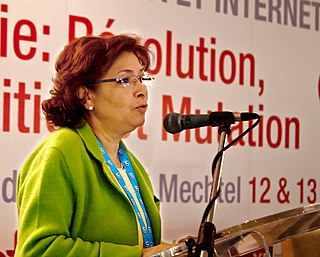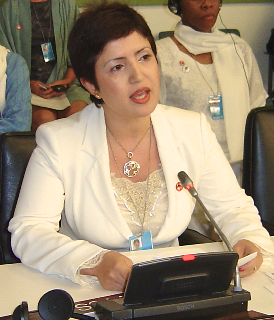Related Research Articles
Armando Valladares Perez is a Cuban-American poet, diplomat and former political prisoner for his involvement in the Cuban dissident movement.

The Secret Life of Words is a 2005 Spanish-Irish drama film written and directed by Isabel Coixet and starring Sarah Polley, Tim Robbins, Javier Cámara and Julie Christie. It was released on 15 December 2006.

Sihem Bensedrine is a Tunisian journalist and human rights activist. In 2005, she was honored with the Oxfam Novib/PEN Award.
Helen Rae Bamber OBE, néeHelen Balmuth, was a British psychotherapist and human rights activist. She worked with Holocaust survivors in Germany after the concentration camps were liberated in 1945. In 1947, she returned to Britain and continued her work, helping to establish Amnesty International and later co-founding the Medical Foundation for the Care of Victims of Torture. In 2005, she created the Helen Bamber Foundation to help survivors of human rights violations.

The International Rehabilitation Council for Torture Victims (IRCT) is an independent, international health professional organization that promotes and supports the rehabilitation of torture victims and works for the prevention of torture worldwide. Based in Denmark, the IRCT is the umbrella organization for over 160 independent torture rehabilitation organizations in 76 countries that treat and assist torture survivors and their families. They advocate for holistic rehabilitation for all victims of torture, which can include access to justice, reparations, and medical, psychological, and psycho-social counseling. The IRCT does this through strengthening the capacity of their membership, enabling an improved policy environment for torture victims, and generating and share knowledge on issues related to the rehabilitation of torture victims. Professionals at the IRCT rehabilitation centers and programs provide treatment for an estimated 100,000 survivors of torture every year. Victims receive multidisciplinary support including medical and psychological care and legal aid. The aim of the rehabilitation process is to empower torture survivors to resume as full a life as possible. In 1988, IRCT, along with founder Inge Genefke, was given the Right Livelihood Award "for helping those whose lives have been shattered by torture to regain their health and personality."
José Quiroga Fuentealba is a cardiologist who served as a physician to Chilean president Salvador Allende. During the 1973 Chilean coup d'état, Quiroga witnessed the Chilean Army assault the government palace. He was detained and beaten until his release was ordered by a Chilean military general.
The United Nations International Day in Support of Victims of Torture is an international observance held annually on 26 June to speak out against the crime of torture and to honor and support victims and survivors throughout the world. The first 26 June events were launched in 1998.
Bangladesh Rehabilitation Centre for Trauma Victims is a Bangladeshi NGO, working in the area of rehabilitation of trauma victims. It was established in 1992. BRCT began its journey by providing medical treatment, legal support, and rehabilitation to the victims on 25 February 1992 with support from foreign medical experts.

Widad Akreyi is a Kurdish health expert and human rights activist. She has co-founded the human rights organization Defend International and is the author of several books about both health issues and human rights.
DIGNITY - Danish Institute Against Torture is a self-governing institution independent of party politics located in Denmark. The institution works to expose and document torture on a health professional basis, develop clinical diagnoses and treatment methods of torture survivors, educate in order to contribute to the global effort to abolish torture. DIGNITY's work has both Danish and international reach, mainly focussing on the prevention of torture and the rehabilitation of torture victims.

Svetlana Alekseevna Gannushkina is a mathematician and human rights activist in Russia who was reported to have been a serious contender for the 2010 Nobel Peace Prize.
The Institute of Therapy and Investigation into the Effects of Torture and State Violence is a multidisciplinary non-governmental organisation based in Bolivia. It offers assistance to those affected directly or indirectly by torture and state violence through rehabilitative means.

Torture: Journal on Rehabilitation of Torture Victims and Prevention of Torture is a peer-reviewed medical journal on rehabilitation of torture victims and prevention of torture, published triannually by the International Rehabilitation Council for Torture Victims.

The Program for Torture Victims (PTV) is a non-profit organization that provides medical, psychological, case management and legal services to torture survivors. PTV serves more than 300 victims of state-sponsored torture from over 65 countries annually.
Ioanna Babassika is a Greek human rights lawyer. Since 2000, she is a member of the Committee for the Prevention of Torture, elected in respect of Greece. She is, since 1989, legal counsellor of the Medical Rehabilitation Centre for Torture Victims, an NGO based in Athens affiliated with the International Rehabilitation Council for Torture Victims. She was chairperson of the EU Association of Amnesty International 1990-1995. She worked for the United Nations High Commissioner for Refugees 1988-1990. She was also President of the European Studies Association 1981-1984.
The Inge Genefke Award is granted every second year by the Anti-Torture Support Foundation to a person who has carried out particularly outstanding work against torture. Named after Dr. Inge Genefke, a Danish physician and trailblazer in the worldwide fight against torture, the award can not be applied for, but is given by the decision of the board of the Anti-Torture Support Foundation.
University of Oslo's Human Rights Award honours individuals who have made important contributions in different fields. The award was launched in 1986 and since then, it is awarded every year to notable people from different walks of life. Those years when the award was not distributed are 1997, 1999, 2003, and 2004.

Nora Sveaass is a Norwegian psychologist, and an expert on refugees, human rights violations, and psychological consequences of torture and violence as well as treatment and rehabilitation of victims of torture and violence. She is Professor of Psychology at the Department of Psychology of the University of Oslo. She served two terms as one of the nine members of the United Nations Committee against Torture from 2005 to 2013, after being nominated as the joint candidate of the governments of the Nordic countries. She did not stand for reelection in 2013; however, in 2015 she was elected as a member of the United Nations Subcommittee on Prevention of Torture, and she is the only member to have served on both committees.
Since 1996 the editors of the European editions of the Reader's Digest magazine have named "European of the Year" individuals who best embody the traditions and values of Europe.
References
- ↑ Portrait: INGE Genefke Archived 2014-09-03 at the Wayback Machine
- ↑ "Inge Genefke / Rehabilitation and Research Centre for Torture Victims". The Right Livelihood Award. Retrieved 2020-01-08.